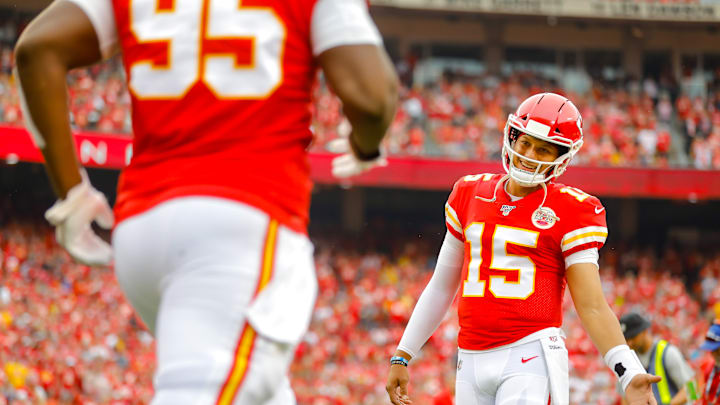If you've been following conversations around the NFL, the expectation was that star defensive tackle Chris Jones would have a new contract in place by the time the Kansas City Chiefs convened its annual training camp in St. Joseph. In reality, the two sides (Jones and general manager Brett Veach) appear no closer to an extension than they were a month ago at this time.
The Chiefs have now logged 10 training camp practices at Missouri Western State University. According to a source close to ESPN's Adam Schefter, the sides are still reportedly "far apart."
Throughout the offseason, it appeared the last domino that had to fall before a deal could be made was the extension of New York Jets' defensive tackle Quinnen Williams. He agreed to a new, four-year $96 million deal on July 14th (nine days before KC opened its annual training camp). Nearly three weeks later, why is this still unresolved?
We all assumed the average annual value of Jones' deal would fall somewhere between Williams' $24m yearly average and Aaron Donald's $31.6m annual take. The question was always: will Jones land closer to Williams or Donald? Nate Taylor of The Athletic reported that $30 million was Jones' magic number.
Let's have a nuanced conversation about why Patrick Mahomes' modest contract expectations are bigger than Chris Jones's.
With so much uncertainty surrounding when this will be resolved, some have asked why players like Patrick Mahomes and Travis Kelce are accepting more modest deals than necessary. Sports Illustrated's Matt Verderame put it this way:
I've said before, but it's worth repeating:
— Matt Verderame (@MattVerderame) August 2, 2023
Mahomes and Kelce took less, in large part to maintain a great roster.
If KC doesn't pay Tyreek Hill, that's one thing. He's on offense. If KC doesn't pay Chris Jones, it begs the question for those guys ... why are we taking less? https://t.co/K4XZZ5W2T9
If the objective of their sacrifice isn't to ensure key players get extended, why not demand more from their own contract talks? That's a challenging question I needed time to mull over.
A day after some thinking this through, here's what I've come up with. Before I attempt to answer, here's my disclaimer: what I'm about to say may not be wholly satisfactory. My only ask is that you consider this with an open mind.
Perhaps our collective understanding of the purpose behind sacrificing contract size is built upon a faulty premise. It might seem counterintuitive, but the goal of those decisions is to maintain salary cap flexibility. In theory, that should mean that Chris Jones gets the extension he deserves, but in practice, those two things could also prove to be competing goods.
We saw this play out just last year when All-Pro wide receiver Tyreek Hill was traded to the Miami Dolphins in exchange for a slate of draft picks. Trent McDuffie, Skyy Moore, and Joshua Williams were the net result of that blockbuster trade and all three played a key role in the Chiefs winning Super Bowl 57. The cap savings will have a residual impact over the next few seasons. One can certainly argue with the methodology, but not with the result.
Make no mistake: I'm convinced Chris Jones will ultimately be extended, but the Chiefs were right to enter this negotiation thoughtfully. No one in the Kingdom wants to see Chris Jones traded or have his contract expire in Kansas City. He's the best defensive player the team has and was instrumental in KC winning its second Super Bowl title in four years. That said, we must remind ourselves that the goal is to remain competitive, from a personnel standpoint, from slot 1 to 53. This strategy will always extend beyond any star player on this roster. In fact, it won't even be limited to the team's best players.
"You gotta find that line where you're making a good amount of money but you're still keeping a lot of great players around you so you can win these Super Bowls and you're able to compete in these games," said Patrick Mahomes recently when asked about his ultimate priorities.
I'm simply issuing this as a reminder because this conversation will inevitably crop up again next offseason with L'Jarius Sneed, Tommy Townsend, Mike Danna and Willie Gay, Jr. all pending free agency next offseason. The Chiefs will win this battle, but there will no doubt be other cap casualties of this war. The goal for each of us will be to remember the team's objective. Overspending, even for the best players in the organization will compromise the mission to stay competitive during Kansas City's dynasty window.
